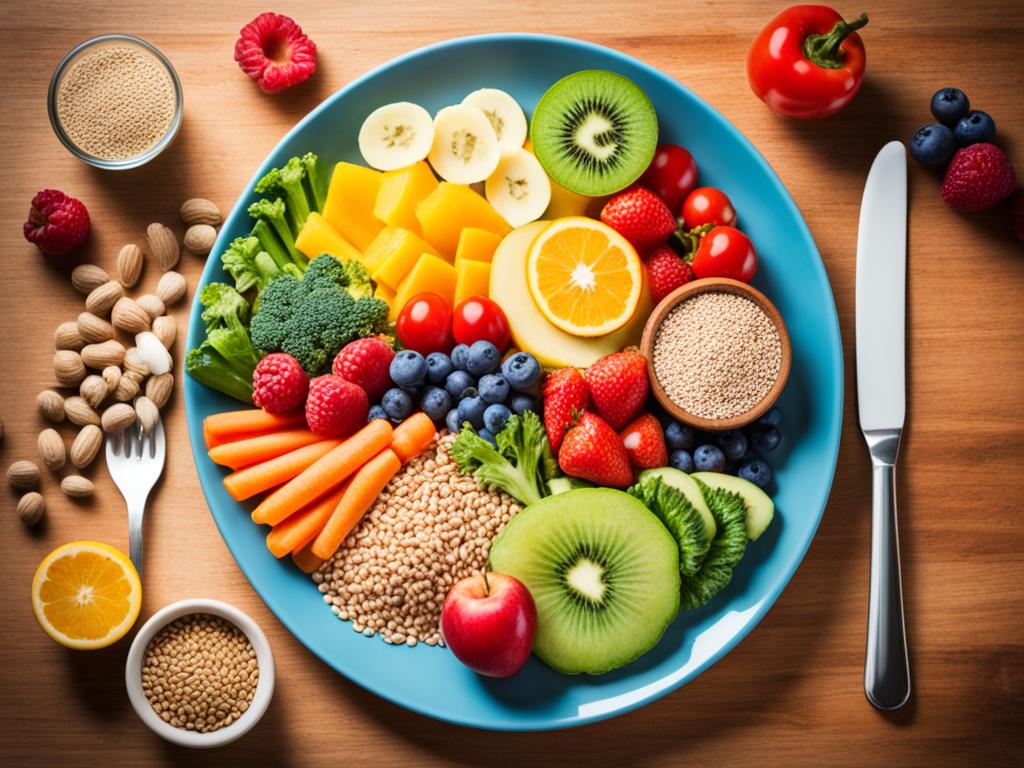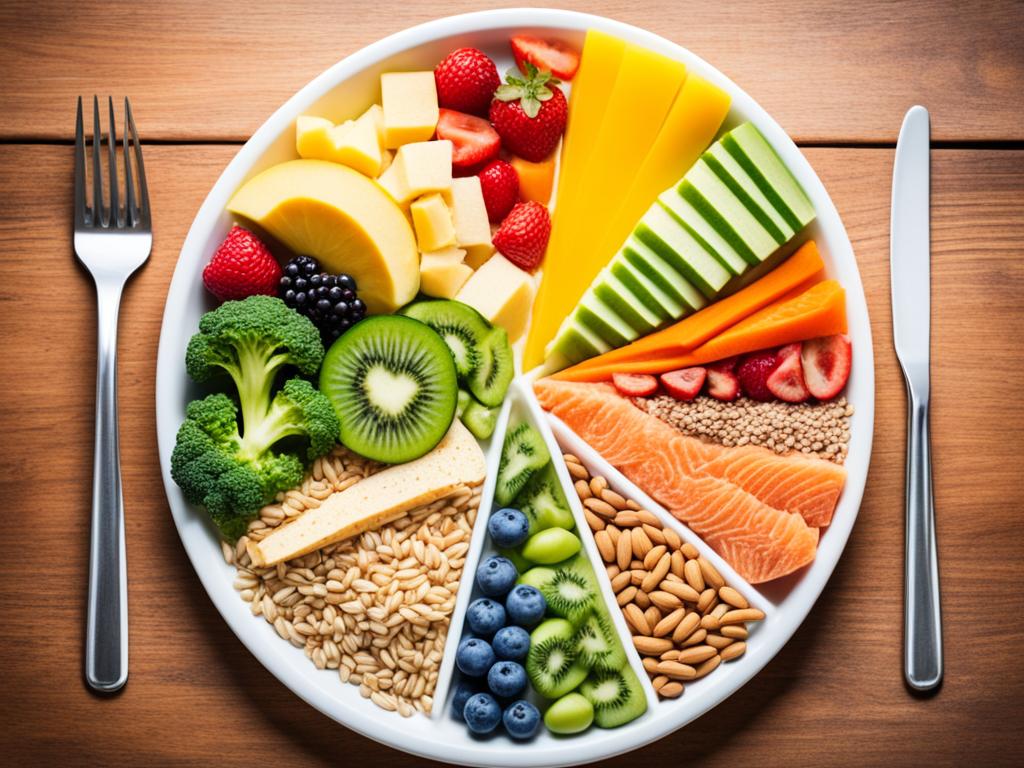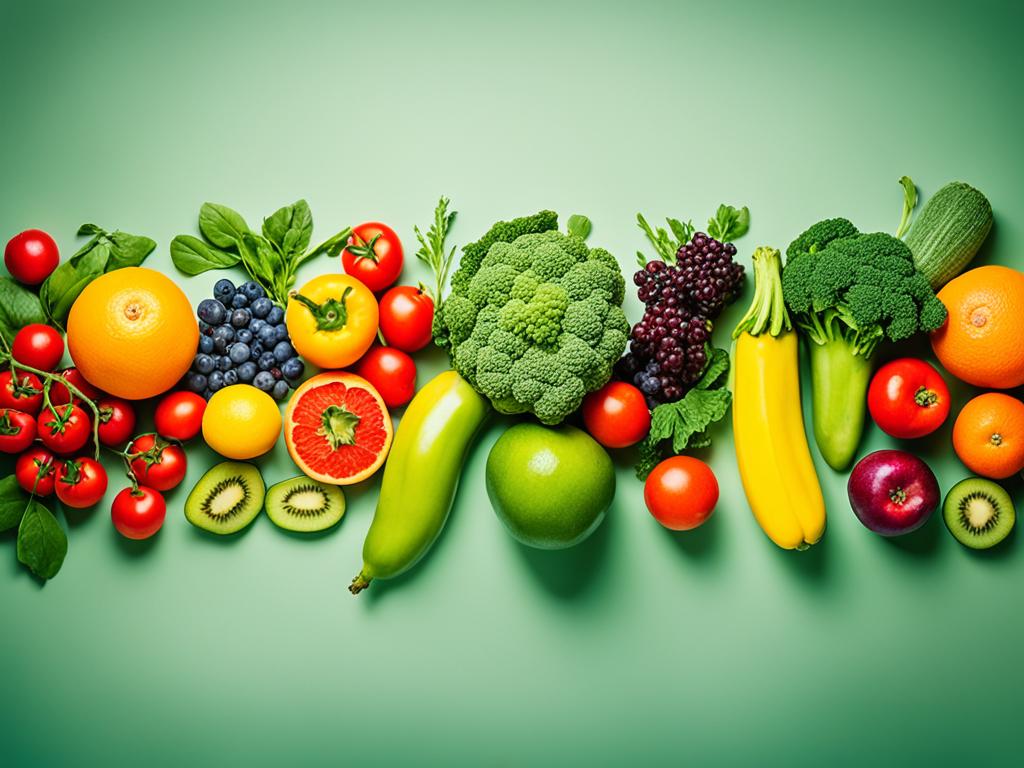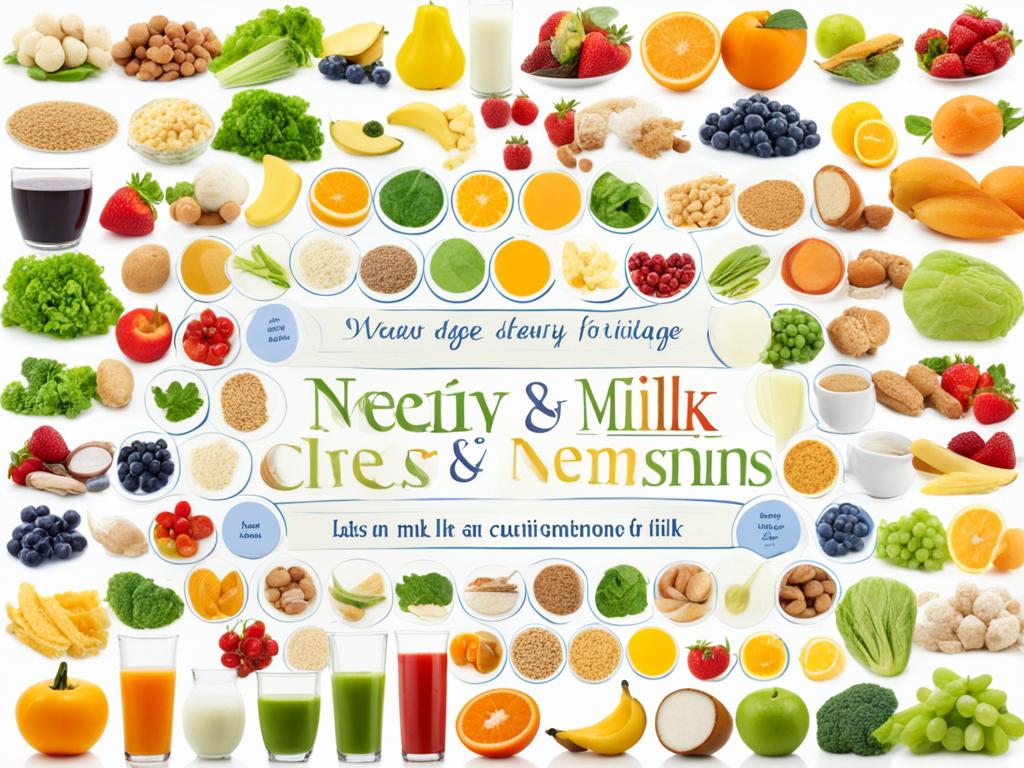
Nutrition: Essential Tips for a Healthy Lifestyle
Nutrition is key to a healthy and lively life. In today’s busy world, knowing how to eat right is vital. This guide will cover the basics of nutrition and why choosing the right foods is important for our health.
A nutritious diet is the foundation of a healthy life. By focusing on a balanced diet, we get the right mix of carbs, proteins, fats, vitamins, and minerals. These nutrients are crucial for our bodies to work well. Learning about them helps us live a healthy and vibrant life.

Keeping a healthy weight is also important for nutrition. By understanding how calories, activity, and weight are connected, we can make better food and exercise choices. This balance helps us stay at a healthy weight, boosts our overall health, and prevents diseases.
Nutrition: Embracing a Balanced Diet
Keeping a balanced diet is key to a healthy life. By eating a mix of nutritious foods, we get the right mix of nutrients our bodies need.
Understanding Macronutrients
Macronutrients give us energy and help build our cells. They include carbohydrates, proteins, and fats. It’s important to balance these for good health.
The Importance of Micronutrients
Micronutrients like vitamins and minerals are crucial for our health. They help keep our immune system strong, control metabolism, and support cell growth. Eating a variety of fruits, veggies, and whole grains ensures we get all the micronutrients we need.

To eat well, we should eat different food groups like grains, proteins, fruits, veggies, and dairy. Choosing whole foods rich in nutrients helps us get the right amount of macronutrients and micronutrients for good health.
Nutrition and Weight Management
Keeping a healthy weight is key to feeling good. Nutrition is a big part of this. It’s all about balancing how many calories you eat and how many you burn.
To keep a healthy weight, you need to understand how food affects your body. Eating nutrient-dense, whole foods helps you get the right amount of calories. This supports your goals for weight management.
- Focus on lean proteins, fresh fruits and vegetables, and whole grains for a balanced diet.
- Try to avoid processed, high-calorie foods and sugary drinks. They can lead to eating too many calories and gaining weight.
- Watch how much you eat and eat mindfully. This helps you get the nutrients you need without eating too much.
| Nutrient | Role in Weight Management |
|---|---|
| Protein | Helps maintain muscle mass and supports a healthy metabolism. |
| Fiber | Promotes feelings of fullness and supports digestive health. |
| Healthy Fats | Provide essential nutrients and can help regulate hunger hormones. |
Choosing the right nutrition can help you manage your weight. It ensures you eat the right amount of calories. This leads to a nutritious, balanced lifestyle.

Nutrition for Optimal Health
Proper nutrition is key for staying healthy and feeling good. Eating a balanced diet full of vitamins, minerals, and nutrients helps your body work right. It also lowers the chance of not getting enough nutrients.
Preventing Nutritional Deficiencies
Not getting enough nutrients can harm your health. It can weaken your immune system, make you tired, and cause long-term health issues. To avoid this, eat a variety of foods that are packed with nutrients. These include:
- Lean proteins, such as poultry, fish, and legumes
- Whole grains, including quinoa, brown rice, and whole wheat bread
- Leafy green vegetables, such as spinach and kale
- Fruits rich in vitamins and antioxidants, like berries and citrus fruits
- Nuts and seeds, which are excellent sources of healthy fats and minerals
Nutrition: The Role of Hydration
Drinking enough water is key for good health. Water helps control body temperature, aids digestion, and boosts brain function. Experts say to drink at least eight glasses of water a day. But, the right amount can change based on your age, how active you are, and your health.
| Nutrient | Importance | Food Sources |
|---|---|---|
| Vitamin C | Supports immune function and collagen production | Citrus fruits, bell peppers, broccoli |
| Calcium | Promotes healthy bones and teeth | Dairy products, leafy greens, fortified foods |
| Iron | Helps transport oxygen throughout the body | Red meat, poultry, lentils, spinach |

By focusing on a balanced diet and drinking enough water, you can boost your health. This helps prevent nutritional shortages. It leads to a healthier and more lively life.
Nutrition Throughout Life Stages
Proper nutrition is key at every life stage, from childhood to adulthood. Our bodies and nutritional needs change over time. It’s important to know how to feed our growth, development, and overall health at each stage.
Fueling for Growth and Development
In childhood and adolescence, the nutrition we eat is crucial for growth and brain development. A diet full of essential nutrients like protein, vitamins, and minerals gives kids and teens what they need to do well.
- Adequate calorie and macronutrient intake supports healthy growth and development.
- Micronutrients like iron, calcium, and vitamin D are key for strong bones and health.
- Omega-3 fatty acids help with brain and eye development.
When we grow into adulthood, our nutritional needs change. We need to focus on staying healthy, managing weight, and preventing diseases. Eating a diet rich in nutrients suited for our life stage keeps us fueled for everyday life.

Meal Planning for Busy Lifestyles
In today’s fast-paced world, it’s hard to keep a healthy diet with a busy schedule. But, with strategic meal planning and prepping, you can always have nutritious meals ready. This is key for those days when you’re super busy.
Nutrition: Meal Prepping Strategies
Meal prepping is a big help for busy people. It means setting aside time, usually on weekends, to prepare meals ahead. This way, you save time during the week and avoid unhealthy takeouts.
- Identify go-to recipes that are easy to prepare and can be made in bulk, such as hearty soups, stews, or casseroles.
- Chop and pre-portion ingredients, such as vegetables, grains, and proteins, so they are ready to be assembled into meals throughout the week.
- Utilize freezer-friendly containers to store pre-cooked meals, allowing you to quickly reheat and serve them when needed.
It’s important to find a meal planning method that suits you. Try different ways until you find one that keeps you eating healthy, even when you’re super busy.

Adding meal planning and meal prep to your daily life means you always have healthy meals ready. This supports your healthy eating goals and helps you stay organized in busy lifestyles.
Conclusion
This article has shown how important nutrition is for a healthy life. We looked at what a balanced diet means and why it’s key. We also saw how eating right helps with weight control and overall health.
By learning about nutrition and using it in your life, you can get better health and well-being. Eating foods full of nutrients, drinking plenty of water, and planning meals are good steps. These actions make your eating habits better and more helpful for your health.
Remember, getting healthier isn’t about being perfect. It’s about making small, thoughtful changes that you can keep up with. Use the tips from this article to start a journey towards a more lively, full of energy, and balanced life. Let proper nutrition be your guide.
FAQ
What are the key components of a balanced diet?
A balanced diet should have many food groups. This includes fruits, vegetables, whole grains, lean proteins, and healthy fats. It’s key to get enough carbs, proteins, fats, vitamins, and minerals for good health.
How can I ensure I’m getting enough vitamins and minerals?
Eat a variety of nutrient-rich foods like leafy greens, citrus fruits, nuts, seeds, and lean meats. If diet alone can’t meet your needs, think about taking a multivitamin.
What is the recommended daily calorie intake for weight management?
Your daily calorie needs depend on your age, gender, activity level, and weight goals. Most adults should eat between 1,600 to 2,400 calories a day. Adjust this based on your own needs and goals.
How can I prevent nutritional deficiencies?
To avoid nutritional deficiencies, eat a variety of nutrient-rich foods and drink plenty of water. Think about supplements if needed. Watch for signs of deficiency and talk to a healthcare professional if you’re worried about your nutrient intake.
What are the best meal planning strategies for busy lifestyles?
For busy lives, try meal prepping, batch cooking, and using appliances like slow cookers or Instant Pots. Keep your pantry and fridge stocked with quick, healthy foods to make cooking easier.



Nutrition is very much essential for a healthy life.